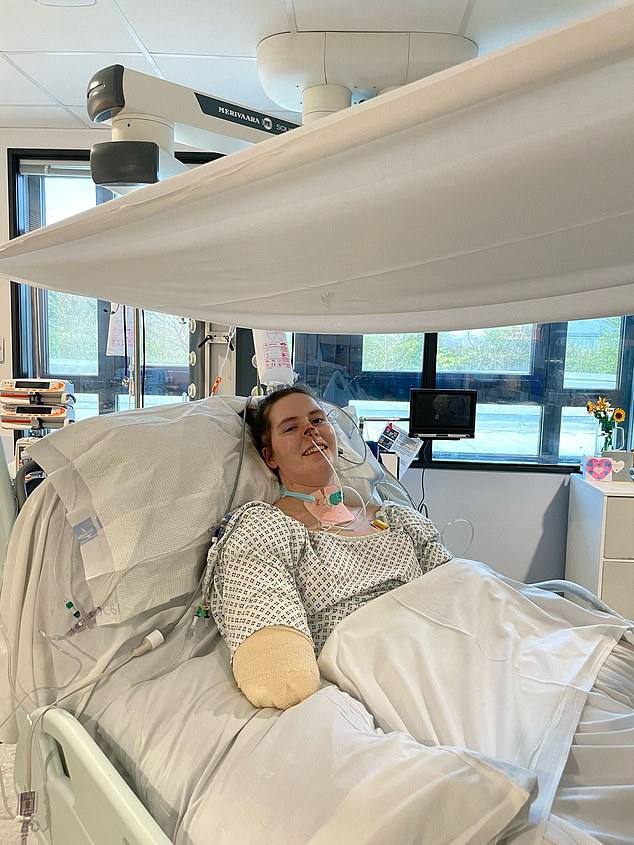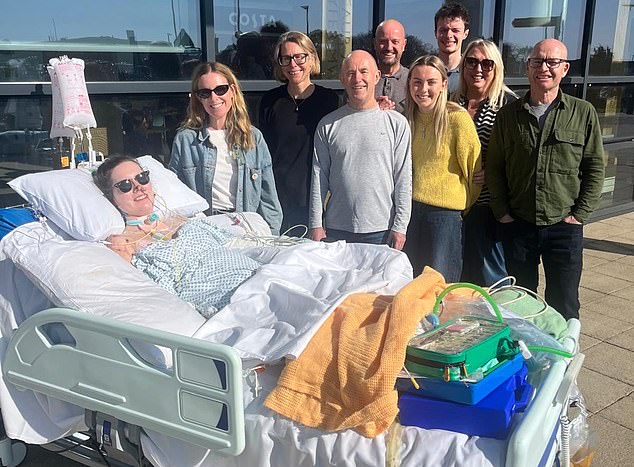- Sport-loving Lily McGarry thought she had flu – but contracted deadly disease
- Medics were forced to amputate her forearms and lower legs to save her life
- Her family is now fundraising for a series of advanced prosthetics
A sporty medical student has been left a quadruple amputee after what she thought was a simple bout of the flu turned out to be a life-threatening sepsis infection.
Lily McGarry, 23, from Jersey, was studying medicine at Cardiff University when she was rushed to A&E in January with flu-like symptoms.
Within hours, Lily, who has been described by her family as ‘kind, thoughtful and positive’, suffered two cardiac arrests and was placed in a medically-induced coma.
Doctors at University Hospital Wales diagnosed the keen athlete with deadly meningococcal septicaemia – a rare and aggressive bacterial infection that can cause rapid organ failure and death if not treated immediately.
When Lily woke up from the coma two weeks later, she was told the infection had caused irreversible damage to all four of her limbs.
Surgeons were forced to amputate both of the Lily’s legs above the knee and her arms at the elbow in order to save her life.
Prior to her illness, Lily, who also has a first-class degree in Medical Pharmacology, was an avid swimmer, runner and surfer.

Sporty medical student Lily McGarry (pictured) has been left a quadruple amputee after contracting a life-threatening sepsis infection

The 23-year-old is a keen fitness enthusiast who enjoys taking part in triathlons

Her family say the quadruple amputation was ‘devastating’ but that she has remained ‘unshaken’ in her determination to live life to the full
Lily’s family said sport is ‘essential’ to her happiness and described her recent quadruple amputation as ‘devastating’.
However, they added that her strength and determination after the life-changing operation has remained ‘unshaken’.
Her mother Jo Gorrod and sister Tanya today set up a GoFundMe to support Lily’s recovery and help her take part in the activities she loves once again.
The online fundraiser has already raised more than £14,000 in less than 24 hours, with nearly 300 people pledging their support.
‘We are committed to ensuring that Lily has the best chance for recovery and the opportunity to pursue her dreams.’ Ms Gorrod wrote on the GoFundMe page.
‘Before her illness, Lily was an avid swimmer, runner, and surfer, and these sports are essential to her well-being and happiness.
‘The advanced prosthetics available through private companies will give her the mobility and independence to return to these activities.

Lily’s family and friends are fundraising to help her get hold of advanced prosthetics so she can return to fitness

The medical student’s fundraiser has hit £21,000 of a £100,000 target as of April 16
‘This will not only aid her physical recovery but also allow her to reconnect with the passions that have always brought her joy.
‘Funds raised here will go directly towards prosthetics, adaptations to living environment, as well as the physiotherapy and rehabilitation necessary for Lily’s recovery.
‘Any funds not directly used for Lily’s care will be donated to Limb Power, a charity that supports amputees and individuals with limb impairments through physical activity, sport, and the arts to enhance their quality of life and aid in lifelong rehabilitation.’
She added: ‘Your support will make a world of difference in helping Lily rebuild her life, regain her independence, and pursue her dreams.’
To donate to Lily’s GoFundMe page, click here.








